NEW INSTRUCTIONS AND ARRANGEMENTS
Now we come to a new beginning. It is difficult for us to realize what a revolutionary beginning it is. The dispensation of human conscience is over, and God is putting man under government—he is to govern himself.
We will see something of this in the covenant which God made with Noah. And let’s keep in mind that, when God made the covenant with Noah, He made it with you and me, for He made it with all mankind.
Chapters 6, 7, and 8 describe God’s destruction of the world in a massive flood. Now, in Genesis 9, Scripture describes God’s dealings with Noah and his sons following the flood.
First, God blesses them and gives specific instructions, including the command to fill the earth.
Next, God expands on His promise to never again end all life on earth a flood.
Finally, Noah curses Ham and blesses Shem and Japheth after Ham tells his brothers about seeing Noah passed out drunk and naked.
Chapters 10 and 11 will sketch out the history of mankind from Noah to Abraham.
Genesis 9:1-17 KJV
[1] And God blessed Noah and his sons, and said unto them, Be fruitful, and multiply, and replenish the earth.
[2] And the fear of you and the dread of you shall be upon every beast of the earth, and upon every fowl of the air, upon all that moveth upon the earth, and upon all the fishes of the sea; into your hand are they delivered.
[3] Every moving thing that liveth shall be meat for you; even as the green herb have I given you all things.
[4] But flesh with the life thereof, which is the blood thereof, shall ye not eat.
[5] And surely your blood of your lives will I require; at the hand of every beast will I require it, and at the hand of man; at the hand of every man’s brother will I require the life of man.
[6] Whoso sheddeth man’s blood, by man shall his blood be shed: for in the image of God made he man.
[7] And you, be ye fruitful, and multiply; bring forth abundantly in the earth, and multiply therein.
[8] And God spake unto Noah, and to his sons with him, saying,
[9] And I, behold, I establish my covenant with you, and with your seed after you;
[10] And with every living creature that is with you, of the fowl, of the cattle, and of every beast of the earth with you; from all that go out of the ark, to every beast of the earth.
[11] And I will establish my covenant with you; neither shall all flesh be cut off any more by the waters of a flood; neither shall there any more be a flood to destroy the earth.
[12] And God said, This is the token of the covenant which I make between me and you and every living creature that is with you, for perpetual generations:
[13] I do set my bow in the cloud, and it shall be for a token of a covenant between me and the earth.
[14] And it shall come to pass, when I bring a cloud over the earth, that the bow shall be seen in the cloud:
[15] And I will remember my covenant, which is between me and you and every living creature of all flesh; and the waters shall no more become a flood to destroy all flesh.
[16] And the bow shall be in the cloud; and I will look upon it, that I may remember the everlasting covenant between God and every living creature of all flesh that is upon the earth.
[17] And God said unto Noah, This is the token of the covenant, which I have established between me and all flesh that is upon the earth.
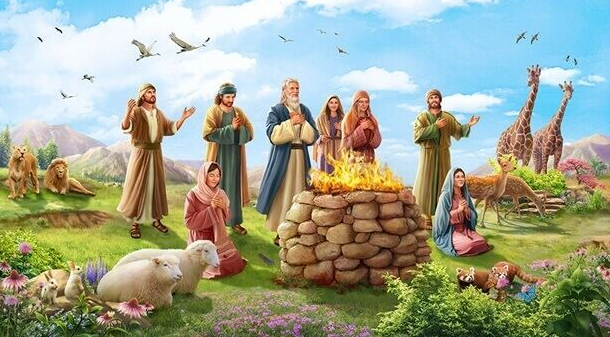
Genesis 9:1 KJV
And God blessed Noah and his sons, and said unto them, Be fruitful, and multiply, and replenish the earth.
God had made the man and the woman on the sixth day of creation, instructing them to, be fruitful, and multiply, and replenish the earth, found in Genesis 1: 28.
Now, after the judgment carried out through the great flood, God begins what we might call a “re-creation” with Noah and his sons. Eight people are to fulfill the mandate given to Adam and Eve, found in Genesis 7:13, and 1 Peter 3: 20.
The word replenish is meaningful here because we know that there was a civilization before the Flood, and now there is to be a civilization after the Flood.
(When Adam was told to replenish the earth, we assume that there had been living creatures—I don’t know what to call them—before Adam. They apparently were living creatures of God’s creation; anything I could say beyond that would be pure speculation.)
Notice that the first thing God tells Noah to do is to “be fruitful, and multiply, and replenish the earth.” There is to be the propagation of the race.
Remember that God gave this command under special circumstances. Today we are in a time of population explosion, and there is overpopulation that is quite dangerous.
However, Noah stood in a unique position. He and his family were the only folk around.
Can you imagine driving down the freeway, going to work in the morning, and there are cars in front of you, cars to the right of you, cars to the left of you, cars behind you, cars honking—you’re in a traffic snarl.
Then about a year later you go out on the freeway and there is not another car there. Yours is the only one. You might as well take down all the traffic lights. You won’t need them because you are the only one driving through.
This would be quite an unusual experience for us, would it not?
Well, this was the experience of Noah in his day.
Genesis 9 begins with God’s blessing on, and charge to, the humans who remain alive on the earth.
This blessing is similar to God’s blessing on humankind in Genesis 1:28 and Genesis 5:2.
This is also the third instance so far in Scripture where God commands humanity to be fruitful and multiply and fill the earth (Genesis 1:28; 8:17).
In a very real sense, this blessing shows that God is beginning again with Noah what He started with Adam.
This time, however, there will be specific differences set out from the start of this reboot of God’s relationship with humanity.
Among these will be slightly different directions regarding food and the consequences of murder, for example.
The tendency of animals to fear and flee human beings will also be brought up in this passage.
Previously, God indicated that the animals of the ark were meant to repopulate the land devastated by the flood (Genesis 8:17).
Now, God’s command defines for Noah and his sons their greatest remaining purpose: reproduce.
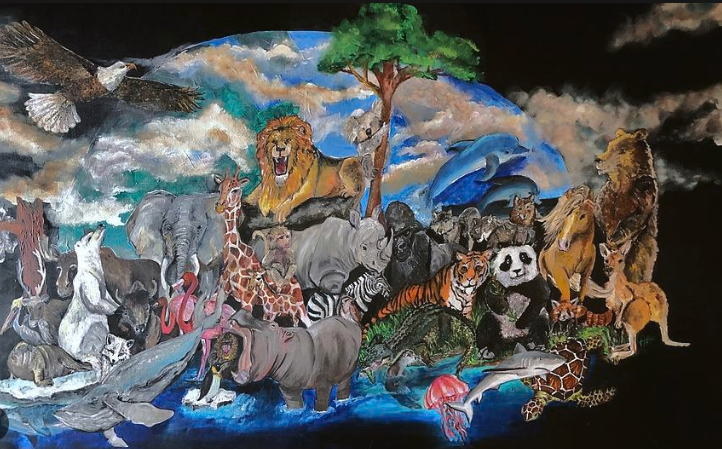
Genesis 9:2 KJV
And the fear of you and the dread of you shall be upon every beast of the earth, and upon every fowl of the air, upon all that moveth upon the earth, and upon all the fishes of the sea; into your hand are they delivered.
And the fear of you and the dread of you; The second part re-establishes man‘s dominion over the inferior animals.
It was now founded not as at first in love and kindness, but in terror; this dread of man prevails among all the stronger as well as the weaker members of the animal tribes and keeps away from his haunts all but those employed in his service.
Another part of the covenant is man’s protection and rulership over the animal world. I take it that before this time the relationship was different.
Apparently man had not been a meat eater before. All the animals were tame, and one is not inclined to eat an animal that is a pet.
Remember that the animals came to Noah when the Flood was impending; they seemed to have no fear of him at all. Now the animals will fear and dread man.
However, man is responsible for the animal world. Man’s treatment of the animal world is a brutal story. Man has attempted to exterminate many of the animals.
Man would have slaughtered all the whales around the Hawaiian Islands for the money they could get if the government had not intervened.
At one time the buffalo were in great herds in the West, but they were killed by man. Today we must have places of refuge to protect animals and bird life.
It is well that we do that. The animals of Africa are being exterminated. Man is a mighty brutal creature. We need a government to protect the animals from man.
These first verses of Genesis 9 repeat some of the language God used with Adam and Eve when He blessed them.
After commanding Noah and his sons to be fruitful and multiply and fill the earth in the previous verse, God now speaks to them about subduing the animal kingdom, as He did with Adam (Genesis 1:28).
This command to rule over the animal kingdom is different from the original version given in Eden, however.
Instead of merely commanding Noah to subdue the earth, God tells Noah and sons that the animal kingdom will fear them.
Every kind of non-human life will be fearful of humankind.
Some interpret this to mean that, prior to the flood, animals did not fear man.
Others suggest that this simply reinforces the hostile, difficult nature of survival in the post-flood world.
Now, however, God promises that humanity will triumph over the animal kingdom as if in a military battle.
Humanity will reign supreme on the earth, even over the most fearsome of the animals.
Whether or not animals feared man before the flood, and whether or not they had eaten them prior to flood, the relationship established upon leaving the ark is certain.
This verse establishes a mostly adversarial relationship between man and animals, something else lost from the paradise of Eden as the result of man’s sinfulness.

Genesis 9:3 KJV
Every moving thing that liveth shall be meat for you; even as the green herb have I given you all things.
Humanity’s diet now is expanded beyond the vegetation permitted in Genesis 1: 30, and meat becomes a new source of protein. We may wonder why God gives such permission at this particular time since creatures are not especially numerous.
Unclean animals had been taken aboard the ark in twos, while clean animals had been taken by sevens, found in Genesis 7: 2, 3; and some of the latter have already been sacrificed in Genesis 8: 20.
But capture of creatures for food will not be easy since they now fear humans found in Genesis 9: 2.
It seems that just as man has to sweat to produce food from the ground found in Genesis 3: 19, he now will be required to exercise a similar effort to obtain meat from earth’s creatures.
Now God gives to man a new provision for food. Before the Flood God gave to man the green earth, the plant life, to eat. Now He tells Noah that he is able to eat animal life.
These first verses of Genesis 9 echo God’s blessings and commands to Adam, but with certain changes. As He did with Adam, God tells Noah and his sons to be fruitful and multiply and fill the earth (Genesis 9:1).
Instead of simply commanding them to subdue the earth, God describes humanity’s adversarial relationship with the animals. In this man-dominated relationship, animal-kind would fear people and people will triumph (Genesis 9:2).
God had said to Adam that he could eat from every plant, except for a single forbidden trees. God again gives humanity specific permission to eat, saying to Noah and his sons that they can eat anything that moves, as well as any of the plants.
This, in part, might explain the reason why man’s relationship with animals is characterized in this passage as hostile.
At this point in God’s relationship with humankind, no restriction is mentioned about defining certain animals as edible or inedible: clean or unclean.
This may have been understood, in the sense that Noah would have considered those animals not previously defined as “clean” as inappropriate to eat (Genesis 7).
The other possibility is that humans may have been free to eat animals categorized as “unclean” until God made them off-limits for His people in the Law (Leviticus 11, Deuteronomy 14).
The permission to eat anything that moves may have included an implied restriction against eating animals which had died of natural causes. In other words, only animals “moving” when man decided to eat them were acceptable.
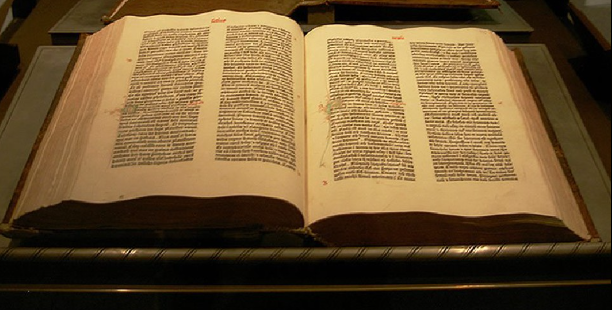
Genesis 9:4 KJV
But flesh with the life thereof, which is the blood thereof, shall ye not eat.
God next imposes a limitation on the new allowance concerning humanity’s diet: people are forbidden to eat flesh, or meat, with its blood. The restriction and the reason for it will be restated in the Mosaic law in Leviticus 17:10–14, and Deuteronomy 12:16, 23–25.
Taken together, the passages from Genesis, Leviticus, and Deuteronomy imply that blood either is or somehow represents a creature’s life force.
One may suggest that the center of life is in the heart or the brain, but these organs function only if the supply of blood to them is maintained. To cut off the blood supply means certain death.
The draining of the blood before eating the meat was a way of returning the life force of the animal to the God who gave it life. This offers recognition that individuals have taken the life with permission and are partaking of God’s bounty as His guests.
Some suggest that this principle remains intact today, found in Acts 15:20, 29. Others point to Jesus’s purging of all meats found in Mark 7:18, 19 as a basis for saying that dietary regulations from the Old Testament are no longer binding.
This may be one of those areas where differences of opinion can exist without passing judgment on those who hold them found in Romans 14:1– 4.
The blood should be drained out. The blood speaks of life; draining it indicates that the animal should be killed in a merciful way rather than prolonging its suffering and that it must be really dead.
These first few verses of Genesis 9 include God’s blessings and commands to Noah and his sons. These instructions are also meant for the generations that will follow from them.
In the previous verse, God made clear that humanity was free to eat any kind of creature that moved. This would include birds, fish, beasts, and creeping things.
Whether or not mankind was specifically allowed to eat animals prior to flood, they are given specific permission now to do just that.
However, while God does allow man the ability to eat animal flesh, He includes a restriction: Humans are not to eat the blood of these animals along with their flesh. The verse describes the blood as the animal’s life.
Later, under the Law of Moses, Israelites will be required to very carefully drain the blood from animals before consuming them. This deep respect for blood is the first step in a long process, establishing the symbolism of Christ’s sacrifice for human sin on the cross.

Genesis 9:5 KJV
And surely your blood of your lives will I require; at the hand of every beast will I require it, and at the hand of man; at the hand of every man’s brother will I require the life of man.
God expands on the previous stipulation. So important is the principle that life is in the blood that He states and surely your blood of your lives will I require. God will, first of all, require a reckoning for human life that is taken by every beast that is responsible for so doing.
God declares that He will keep a record of every person killed by a member of the animal kingdom, and He will hold the deadly animal accountable. Of course, animals do not understand the concept of guilt, even so, they are accountable to their Creator for their actions.
How much more, then, is this the case with those created in God’s image, beings who are capable of understanding guilt! Both this verse and the next address our accountability to God in this regard.
This is an interesting statement, but not so meaningful to those of us who do not live on a frontier.
However, there are certain animals even we encounter—such as skunks and opossums which may be rabid or disease-carrying rodents—that pose a real danger to man.
Now the fifth and the last statement in the new covenant is the most amazing—
Genesis 9 opens with God’s blessings and commands to humanity as the world resets following the flood. In the previous verse, God commanded humans not to eat the blood of animals, calling the blood the creature’s “life.”
This is one of the first moments in Scripture where blood, specifically, is tied to life. Later, through moments such as the first Passover (Exodus 12:1–7), and the sacrifices in the temple (Exodus 29:19–21; Leviticus 4:1–21), this reverence for blood will be magnified.
The ultimate meaning of this symbol will be fulfilled in the sacrifice of Jesus Christ on the cross (John 1:29; 1 Corinthians 5:7).
This verse pivots from an animal’s lifeblood to the shedding of the blood of humans.
This is a new command for the way human communities should conduct themselves; it is a change from God’s requirements for mankind before the flood. Specifically, God will require a reckoning—a dire accountability—when the lifeblood of a person is shed.
God will require that reckoning whether the one who kills a person is a man or an animal. The next verse will reveal that reckoning to be the death of the one who kills any human being.
Following the first recorded murder in Scripture, God allowed Cain to live and, in fact, to thrive on the earth. With this new beginning after the flood, however, God will require death for the intentional, unjustified killing of another person.
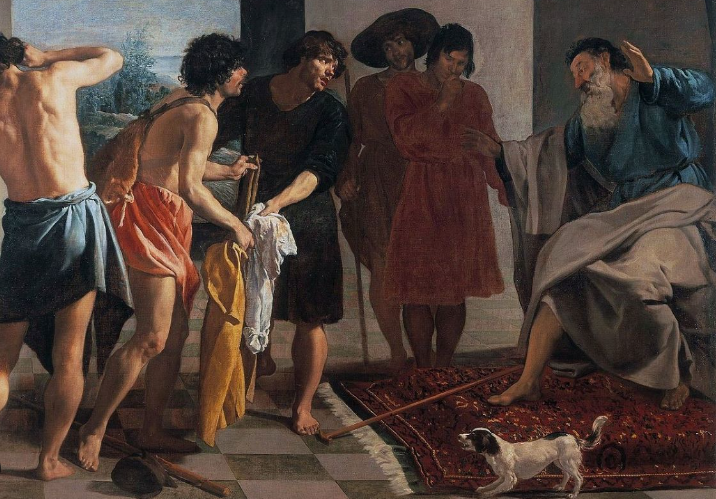
Genesis 9:6 KJV
Whoso sheddeth man’s blood, by man shall his blood be shed: for in the image of God made he man.
God requires of humans that the life of a murderer, whoso sheddeth man’s blood, must be taken as punishment for the heinous act.
This principle is later embedded within the Law of Moses, where a distinction is made between premeditated murder and what we would call involuntary manslaughter today, found in Exodus 21:12-14.
The reason for the kind of punishment we see in our text is based on our uniqueness as creatures made in the image of God .
So passionate is God about preserving and protecting this uniqueness that destroying a life must be disciplined to the ultimate degree: life for life, also see Leviticus 24:17 and Numbers 35:31.
The Old Testament basis for capital punishment is thus quite clear. To take the life of a murderer is to be considered an act of the utmost respect for life-life as a creative gift of God.
Capital punishment is not a barbaric, inhuman act; instead, it is a just response to a deed that has demonstrated the ultimate contempt for the one who creates life. Capital punishment is controversial today, even within Christianity.
Some may question whether the principle of, life for life, is still valid, given the fact that we are no longer under the old law, but are under grace, found in Romans 6: 14.
To this concern we can point out that although Jesus has indeed, abolished in his flesh … the law of commandments contained in ordinances, found in Ephesians 2:15 by, nailing it to his cross, found in Colossians 2:14, the requirement of Genesis 9:6 predates the Law of Moses.
Further, the New Testament itself seems to indicate that capital punishment is still valid, found in Romans 13:4 and Acts 25:11. Here God lays down the principle for government and protection of man. He gives the government the right of capital punishment.
We have seen that in this new covenant which God has given, man is to propagate the race, he is to have the protectorate and the rulership over animals, he is given a new provision for food and a prohibition against the eating of blood.
Now we see that he is given the principle of government, which is the basis of capital punishment. May I say to you that it is amazing how the attitude of the present generation has gotten away from the Bible. You see, we do not have a Bible-oriented population anymore.
It is almost totally ignorant of the Word of God. As a result, we find the judges, the lawyers, and the politicians all wanting to get rid of capital punishment.
They have succeeded in many cases, and I think that finally it will be eliminated totally from American culture. At the same time we have an increase in crime and the most horrible crimes taking place.
I believe that capital punishment is scriptural and that it is the basis of government. The government has the right to take a life when that individual has taken someone else’s life.
Why?
Well, I think it is quite obvious that God has ruled it so in order to protect human life. Our lives are no longer safe on the streets and often not in our homes, either.
Although I know that many officials would deny this, one reason is our attitude toward capital punishment. When a criminal knows that if he takes a life, his life is going to be sacrificed, then may I say to you, he’ll think twice before he takes a life.
Also, there is an idea today about getting a gun-control law. May I say that the problem is not with the gun in the hand, it is with the heart inside the man.
“Whoso sheddeth man’s blood, by man shall his blood be shed” is a law that we had better get back on our statute books and get rid of this sob-sister stuff. Human government is the area into which all mankind has moved (Gentiles included).
“Whoso sheddeth man’s blood, by man shall his blood be shed: for in the image of God made he man” is the basis for human government. It has not been changed as far as the governments of the world are concerned.
In the previous verse, God declared that, from this point forward in the post-flood world, He would require an account or reckoning whenever a human life was ended by man or animal.
This verse describes that reckoning: The person or animal who killed another person was to be killed. The poetic language of the shedding of blood refers to death.
The institution of the death penalty by God differs drastically from His response to Cain’s murder of his brother Abel. Then God allowed Cain to live and even to thrive on the earth (Genesis 4:15–16).
However, the violence on the earth was part of God’s reason for wiping out mankind with the flood (Genesis 6:5).
God gives a specific reason for this new command to kill those who kill others: Humans are made in God’s image (Genesis 1:26–27). God values human life and will not allow the taking of life to stand without the killer giving an account.
This command also shows that human life is valued above animal life in God’s eyes. Men were allowed to kill and eat animals, but men or animals who killed a person would themselves be killed.
This specific reference to capital punishment—an offense worthy of physical death—is also important in that it predates the Law of Moses.
Christians are often divided over the concept of the death penalty. As part of that debate, this verse reminds us that capital punishment did not originate with Moses, but with Noah.

Genesis 9:7 KJV
And you, be ye fruitful, and multiply; bring forth abundantly in the earth, and multiply therein.
This is a repetition of God’s instructions in verse 1.
This verse wraps up the section of blessings and commands by repeating the contents of verse 1:
Noah, his sons, and all humanity to follow were charged with having more and more children and filling up the earth again.
Implied in the command is God’s blessing to make it possible for humanity to continue to reproduce, to continue to receive the gift of children from God’s hand through the process of human reproduction.
God had wiped out humanity for its sinfulness, but God’s intent is for humanity to thrive again under a new and reestablished relationship with Him.
The repeat of this command is also important in that it follows God’s specific call for severe punishment in cases of murder.
In verse 6, God institutes a requirement that any man or animal who murders a human being is to be put to death. The reason given was due to man’s status as an image-bearer of God.
Here, by returning to the issue of expanding the human race, we see a second reason for God’s harsh stance against murder. Rather than allow the kind of violence which had ruined the pre-flood world, God sets a new standard.
Genesis 9:8 KJV
And God spake unto Noah, and to his sons with him, saying,
GOD communicated by talking to them.
One difference of the post-flood era, beginning with chapter 9, is that God is speaking directly to Noah’s sons, as well as to Noah. God is specifically including the next generation in His promises, commands, and blessings.
In prior verses, God established some new details in man’s relationship with animals, including the animal kingdom’s fear of man and permission for humans to eat animal flesh. Blood, however, is not to be eaten.
Prior verses also established that instances of murder, whether by a man or an animal, would require the death penalty. As mankind are the image-bearers of God, God would not allow murder and violence to spread to the extent it did prior to the flood.
In this passage, God will establish a specific agreement with Noah and all of his descendants. This was foreshadowed by God prior to the flood (Genesis 6:18).
This promise from God involves His vow to never again destroy all life on earth with a flood. The sign given to prove this covenant is God’s bow, “set” in the clouds, rather than held ready for battle: the rainbow.

Genesis 9:9 KJV
And I, behold, I establish my covenant with you, and with your seed after you;
God has already told Noah, with thee will I establish my covenant, found in Genesis 6:18, the first time the word covenant appears in the Bible.
Following the great flood, God addresses not only Noah but also his three sons, found in Genesis 5:32; 6:10; 7:13; and 9:18.
God’s covenant includes not only them but their seed, or descendants. Therefore the covenant about to be explained embraces all human beings. “With your seed after you” includes all the human race.
A “covenant” is a solemn agreement between two parties, where each side has certain obligations. Both parties in the covenant are bound to follow through on their end of the agreement.
In some cases, those responsibilities are conditional. In such instances, the requirements are stated as “if this, then that.” In others, the mandates are expected no matter what the other party does.
In Genesis 6:18, God promises to establish a covenant with Noah. Noah’s side of that binding agreement came in his work of building the ark.
Now, as promised, God is about to explain His part of the covenant He has made with humanity through Noah and his sons. God reveals His covenant to all four men and not just to Noah, the patriarch.
This will be a covenant with all of the peoples of the earth to follow from these four men—which means it is a covenant with all the peoples of the world to live since that day.
Specifically, God will promise to never again destroy all life on earth with a flood. As a sign of this promise, God provides the rainbow.
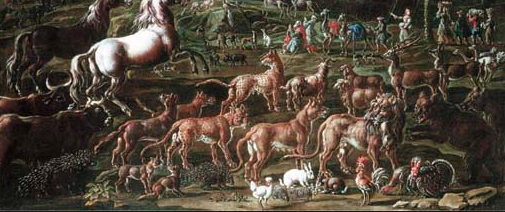
Genesis 9:10 KJV
And with every living creature that is with you, of the fowl, of the cattle, and of every beast of the earth with you; from all that go out of the ark, to every beast of the earth.
God’s covenant also applies to every living creature. Therefore the prohibitions and warnings that were given earlier regarding these creatures and humans are balanced with the establishment of a special covenant with both parties.
The nature of that covenant is explained next. All of God’s creatures are included in this covenant. Isaiah predicts that someday the lion and the lamb will lie down together and that they will not hurt or destroy each other.
In Paul’s Epistle to the Romans he mentions that the whole creation is groaning and travailing in pain in this present age.
May I say to you that God has made this covenant with Noah and with all of His creatures until the time His Kingdom comes on earth. It is for all of Noah’s descendants and “every living creature that is with you.”
Prior to the flood, God promised to establish a covenant with Noah (Genesis 6:18), after Noah demonstrated obedience by building the ark.
In the previous verse, God revealed to Noah and his three sons that He was about to establish His part of that covenant. This agreement would apply to all living things, which were descended from those who left the ark.
A “covenant” is a special type of contract between two parties. In this case it is between God and all of humanity.
What this verse reveals is that the covenant is also between God and all of animal-kind: every kind of creature that survived the flood aboard the ark. God lists them: birds, livestock, every kind of beast, every living thing.
God does not generally make covenant agreements with animals. Yet He gives animals special honor here by including them in this promise.
God shows that, though He wiped out nearly all of animal-kind in the flood, He still cares deeply about these creatures He has created.
God has said that man will triumph over the animals and that humans may eat anything that moves, but that doesn’t mean that God sees animals as worthless or expendable. He makes this promise to them, as well.
The promise, given explicitly in the next verse, is that God will never again destroy all life on earth with a flood.

Genesis 9:11 KJV
And I will establish my covenant with you; neither shall all flesh be cut off any more by the waters of a flood; neither shall there any more be a flood to destroy the earth.
The specifics of the Lord’s covenant are provided: never again will He use the waters of a flood to cut off life and destroy the earth as He has just done. The next destruction of the earth will be by fire, not water found in 2 Peter 3:6-12.
This is God’s promise. His purpose is that He will not again destroy the earth with a flood. The next time His judgment of the earth will be by fire. We find that stated in 2 Peter 3.
In the next few verses we see the picture of the covenant, and in my opinion, really a spiritual meaning of the covenant. It is sort of a sacrament, if you please.
The thing which makes it that is a visible sign to which are annexed promises.
After declaring in the previous few verses that He was about to make a covenant promise to all of humanity, and all of animal-kind, God now reveals the unilateral agreement He is making.
The first part of this agreement was Noah’s responsibility to build an ark (Genesis 6:16–18), after which God said He would establish this binding promise.
This type of covenant agreement was common in ancient times, but this one is unusual in that God also includes animals as participants. They have no particular obligation, but God includes them in His vow.
That oath is given here in direct terms: God will never again use a flood to destroy the earth or to destroy all living things. Period. God is finished with world-killing floods. This is not a casual commitment for God.
The language used here is of a legally binding contract. God is structuring an official agreement that He will bind Himself to for all of the earth’s history.
As with other covenants of that era, God will establish some sign, or proof, indicating that this covenant is real. In this case, God’s sign of the Noahic covenant is a rainbow (Genesis 9:13).
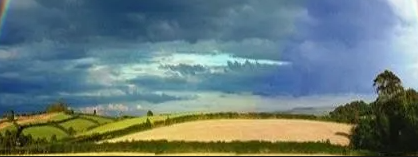
Genesis 9:12 KJV
And God said, This is the token of the covenant which I make between me and you and every living creature that is with you, for perpetual generations:
Once more the all-inclusive nature of the covenant is emphasized: it is for Noah and his sons along with every living creature. Moreover, the covenant is for perpetual generations, which is another way of describing, your seed after you, in Genesis 9:9.
God restates that this covenant promise to never again use a flood to destroy the earth or wipe out every living thing is between Himself and all of humanity for all generations to come.
Interestingly, God also includes all animals as part of this agreement, meaning this vow is not only for the benefit of mankind, but for all living things.
In addition, God will give a visual sign as confirmation of this legally binding contract. This was a common aspect of covenant agreements. Later, when establishing a covenant with Abraham, God will use the sign of circumcision (Genesis 17:11).
That sign is revealed in the next verse: God’s bow, “set” in the sky, rather than being held in God’s hand. The bow was a symbol of warfare, so the symbolism of it being set in the clouds as a human might hang their bow on a wall represents God’s peaceful intentions through the covenant.

Genesis 9:13 KJV
I do set my bow in the cloud, and it shall be for a token of a covenant between me and the earth.
The visual reminder of the bow, or rainbow, is the token of that covenant. The noun bow generally describes an instrument of death, used for hunting or warfare, as found in Genesis 27:3; 48:22; etc.
Genesis 9:13, 14, 16 and Ezekiel 1:28 are the only places in the Old Testament where this word signifies a rainbow.
Perhaps the symbolism in God’s declaration lies in the fact that He is laying aside an instrument of destruction in keeping with His promise not to destroy the earth again by means of a flood.
Some believe that this is the first appearance of a rainbow, marking its significance as part of the covenant that God is establishing.
Others maintain that the rainbow has already been seen on previous occasions after rainfalls, but the rainbow becomes the token of God’s covenant only after He speaks the words in the verse before us.
In the previous verse, God says there will be a sign of the new covenant promise He has made. God vowed to again never destroy the earth or wipe out all living things with a flood. Now He reveals that sign: the rainbow.
More specifically, God says that He has set His bow in the cloud.
The word for bow can be used of a battle bow, but the description of the bow being set on the occasion of clouds and being visible on the earth—along with the fact that the same word can be used for rainbow—makes it clear God is speaking of the rainbow.
This is a “sign” which people can see directly.
The language used by God here is meant to suggest the symbolic hanging up of a battle weapon after the war is done and it is time for peace.
God is taking responsibility for creating rainbows as a symbol of His pledge to humanity and to animals, never again to send a global flood.
While rainbows are a scientific, meteorological phenomenon, Genesis asserts that God is responsible for every scientific and meteorological phenomenon (Genesis 1:1; Psalm 19:1).
God chose to cause rainbows to function as a symbol of His covenant promise.
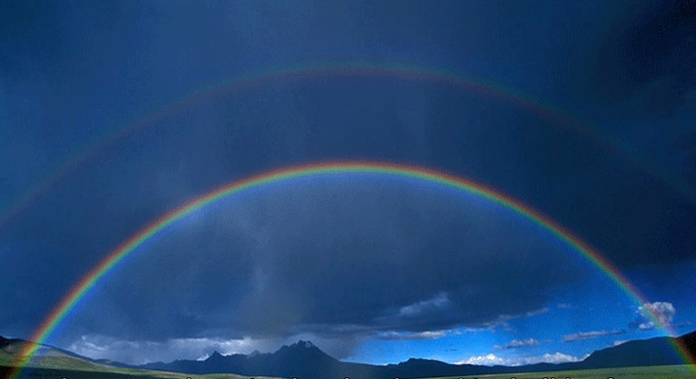
Genesis 9:14 KJV
And it shall come to pass, when I bring a cloud over the earth, that the bow shall be seen in the cloud:
A bow speaks terror, but this has neither string nor arrow; and a bow alone will do little hurt. It is a bow, but it is directed upward, not toward the earth; for the seals of the covenant were intended to comfort, not to terrify.
Verse 14 and 15 complete a single thought. Prior to the flood, God began to establish a covenant agreement with Noah (Genesis 6:18). At that time, the obligation was on Noah to build an ark to hold himself, his family, and the animals God intended to save.
After the flood, God establishes His side of the promise. This binding vow is made to all of the people of the earth, as well as all of the animals. He will never bring a global flood again.
Covenant agreements were often remembered using some kind of visual sign or symbol (Genesis 17:11). In the prior verse, God explained that the sign of this particular covenant would be His bow set in the clouds.
This evokes the idea of a warrior setting his weapon aside once the battle is over and the time has come for peace.
In verses 14 and 15, God begins to describe what will happen when a rainbow becomes visible.

Genesis 9:15 KJV
And I will remember my covenant, which is between me and you and every living creature of all flesh; and the waters shall no more become a flood to destroy all flesh.
God’s memory never fails, of course. So the phrase I will remember does not imply that God might somehow forget certain details and needs a rainbow to be reminded of them.
In a passage such as this, the phrase I will remember carries with it the idea that God is about to act to fulfill a promise He has made.
A similar usage is found in Exodus 2:24, where God hears the cries of the Israelites in bondage in Egypt, and remembered his covenant. God’s response in Exodus 3 is to call Moses to be Israel’s deliverer.
In the case at hand, God takes personal charge of being the deliverer as He continuously ensures that the waters shall no more become a flood to destroy all flesh.
This completes the thought begun in the previous verse. God has established His covenant promise with all life on the earth that He will never again bring a global flood to destroy every living thing.
Now God says that when the rainbow becomes visible against the clouds, He will remember His covenant. He will not send another flood.
Usually in Scripture, signs for covenants are given by humans, not by God. Those signs, such as circumcision (Genesis 17:11), are meant to demonstrate the commitment of people to the covenant and to remind them to hold to the agreement they have made.
In this case, though, the sign is given by God and it is to serve as a reminder to God of the agreement He has made.
It’s an odd idea, to us, that God would somehow need to be reminded of His agreement. He doesn’t need to have His memory jogged, of course, but He claims the right to be reminded anyway.
This is similar to the reason why God, who cannot lie or change (Numbers 23:19; Malachi 3:6), speaks of “covenants” in the first place: to emphasize to mankind the serious nature of His promise.
And while God says that the reminder is for Him, it’s also true that the appearance of the rainbow is a reminder to humanity of God’s covenant promise, of His grace and mercy to all life on the earth.

Genesis 9:16 KJV
And the bow shall be in the cloud; and I will look upon it, that I may remember the everlasting covenant between God and every living creature of all flesh that is upon the earth.
This verse reemphasizes what has already been stated. Notice that God says, “I will look upon it” and “I will remember.” God didn’t say that you would see it; He said that He would see it.
He said He would look upon it and it would be an “everlasting covenant between God and every living creature of all flesh that is upon the earth.” That ought to be the encouragement whenever you look at a rainbow.
Repetition, in ancient literature, was a sign of certainty or emphasis. To repeat the same idea more than once in a row served to establish it as a strong point.
This verse restates the same information given by God in verses 14 and 15, with slightly different language.
This language is typical of God’s relationship with mankind: speaking in human terms for our understanding, though God is above some of the ideas being presented.
Symbolically then, when God “sees” the rainbow in the clouds, He will “remember” His everlasting covenant with every living creature of every kind on earth.
While God does not need to “see” the rainbow or “remember” His agreement, these words clarify that the rainbow is meant for our reassurance.
This verse adds the word “everlasting” to the description of the covenant. This is a unilateral agreement on God’s part, and it is not a casual one.
It does not depend on the faithfulness of humanity or the animals or anyone else to keep the other side of the agreement. God will do it. Period. He will not send a global killing flood. Ever.
Symbolically, the rainbow will always remind God of His promise. Literally, it is meant to remind us as well.
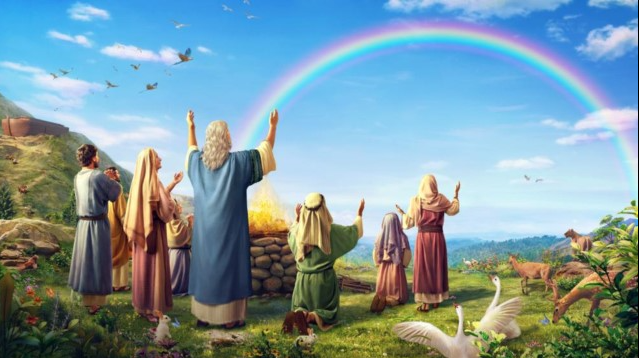
Genesis 9:17 KJV
And God said unto Noah, This is the token of the covenant, which I have established between me and all flesh that is upon the earth.
A final reaffirmation of the rainbow’s importance is given to Noah himself.
This is only fitting since this account of the flood began with God’s message to Noah about how corrupt the earth had become, as found in Genesis 6:13, and of God’s intention to establish His covenant with Noah, found in 6:18.
When Noah is first introduced in Scripture, he is called, a just man and perfect in his generations, as found in Genesis 6:9.
Because Noah faithfully did, according to all that God commanded him, found in 6:22, he is now given the privilege to witness God’s, re-creative, activity and to hear God announce the terms of a covenant with all flesh that is upon the earth.
It is still true that those who faithfully obey and serve God receive numerous blessings, privileges, and insights that remain only mysteries to those who, like the vast majority in Noah’s day, remain entrenched in their wickedness, as found in Matthew 13:10-16 and Colossians 1:26.
This is God’s covenant, not merely with Noah but with all flesh that is upon the earth. Let me say again that the rainbow could be called a sacrament because a sacrament is a visible sign to which are annexed certain promises.
The Passover feast, the brazen serpent, Gideon’s fleece, and in our day, baptism and the Lord’s Supper are such signs. God makes a promise and attaches a sign to it.
Now the rainbow is God’s answer to Noah’s altar. It is as if God says, “I’ll remember, and I’ll look upon it.”
This verse restates, yet again, that the sign of the rainbow is meant to prove His covenant promise to all humanity and all animal-kind forever.
The symbolism hints at a battle bow “set” in the clouds, instead of being held in God’s hand, representing a lasting peace. That peace comes in the form of God’s promise to never flood the earth and destroy all life again.
Notice once more that humans and animals have done nothing to earn or deserve God’s gift of mercy in never wiping out life with a flood again. God established the covenant. God will keep the agreement.
God provided a sign of the promise. As those who live after the terrible, catastrophic destruction of the flood, God’s righteous judgment for the sinfulness and violence on the earth, we are left to simply receive and enjoy God’s promise.
This will serve as a model for other promises of God in the rest of Scripture.
I hope that you have really enjoyed this post,
Please Leave All Comments in the Comment Box Below ↓













This was very interesting reading the details of Genesis 9 and how God gives permission for meat to be included in the human diet. I never realised that it was actually discussed in the Bible, but that the blood had to be drained from the meat, something which is normally done to soften the meat. But now I know it had a Biblical origin.
Thank you for sharing a very insightful post on Noah and his family.
Hello,
You saying that you never realized that GOD gave permission for meat to be included in the human diet reminds me of how important it is for this information to be disseminated.
There are a number of experiences about the early generations of Our (meaning the whole world) forefathers and foremothers mentioned in the Holy Bible that we can learn about simply by reading and studying.
The Holy Bible is more than a book, and is applicable to All generations, it is an Instruction manual on how we should live our lives as Christians.
Thank you so much for sharing your experiences, as well as, referring to this information as a very insightful post on Noah and his family.
Many Blessings Unto You My Friend,
Jerry
I like how you emphasised humans doing nothing to deserve God’s promise not to use water or fire to end the earth again.
It is what I have discovered and enjoyed after giving my life to Christ. His mercy is without repentance. He is merciful, and he keeps his commandment. He is not like other Gods that fail in their responsibility.
Our God is a covenant keeping God
Hello again Parameter,
As always, thank you for continuing to be a part of this HBS & DwJ Platform.
2 Peter 3:10 KJV
[10] But the day of the Lord will come as a thief in the night; in the which the heavens shall pass away with a great noise, and the elements shall melt with fervent heat, the earth also and the works that are therein shall be burned up.
Christian teaching on how the end times will unfold is widely varied. Scholars and theologians studying the prophecies of the Old and New Testaments have reached differing conclusions about the exact order of events.
While there are differences in these specific details, Christians on the whole believe what Peter writes here, as part of the revealed Word of God. That is, that Jesus will return.
And, at some point, God will judge the sins of humanity by bringing Destruction on the Earth with Fire.
Blessings My Friend!
After giving my life to Christ, I have discovered and enjoyed the abundant mercy that He offers.
His mercy is without repentance, meaning that He does not withdraw it or take it back. He is consistently merciful towards us, no matter our past mistakes or shortcomings.
This is a comforting and reassuring truth that brings me great joy. Not only is Christ merciful, but He also keeps His commandments. Unlike other gods or deities that may fail in their responsibilities or promises, Christ remains faithful and true to His word.
His commandments are not burdensome or unattainable, but rather they are meant to guide us towards a life of love, peace, and righteousness.
Hello again Herman,
Thank you for being a continued supporter by reading, sharing your thoughts with us, and commenting on different HBS & DwJ Podcast episodes.
I am truly grateful to be a vessel that connects people to GOD in an informative way.
I believe giving our life to Christ is one of the most important decisions we’ll ever have to make. Congratulations on your decision to do so, as well as your discovery and enjoyment.
Blessings My Friend.
As a beginner with some interest in the topic, I have a question about the article on God’s covenant with Noah and the changes in the relationship between humans and animals after the flood.
The article mentions that after the flood, God told Noah and his sons to “be fruitful, and multiply, and replenish the earth,” which was a similar command given to Adam and Eve in Genesis 1:28. It also explains that the animals’ relationship with humans changed, and they began to fear and dread humans.
My question is, why do you think this change occurred?
Was it a result of the flood and its impact on the environment, or were there other factors at play that caused the animals to fear humans after the flood?
Hello skamalka,
Thank you for being a continued supporter by reading, sharing your thoughts with us, and commenting on different HBS & DwJ Podcast episodes.
I am truly grateful to be a vessel that connects people to GOD in an informative way. In response to your comments and questions:
God puts the “fear” of man into the animals so that they will not totally overrun and destroy mankind. Man is also given the right to use the environment for his purposes (in good stewardship).
God also authorizes for the first time the eating of meat. This may have been done before but not with God’s permission. Perhaps the weather required more protein. Perhaps as a way of population control.
With this being said, no wonder the animals feared humans, I would too if I though I would end up on someone’s dinner table.
Your comments are greatly appreciated.
Blessings My Friend!
Truly remarkable insights into the covenant between God and humanity!
The symbolism of the rainbow as a sign of God’s promise never to destroy the earth with a flood again, coupled with the notion that God Himself “remembers” the covenant, reinforces the depth of His commitment.
The way you’ve unpacked the meaning behind each aspect of the covenant and its implications for humanity’s relationship with both God and the natural world is both enlightening and thought-provoking.
Your commentary eloquently captures the significance of this pivotal moment in biblical history.
Hello again Jason,
Thank you for commenting on another HBS & DwJ Podcast episode.
It pleases me to learn that you continue to read material produced by me. This definitely lets me know that the content is doing its job, by producing results.
I really appreciate the accolades, thank you for your adoration concearning this information, and thanks again for commenting.
Blessings My Friend!